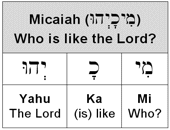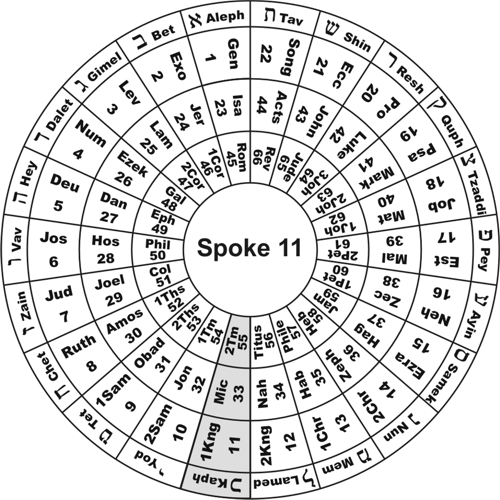Who is a God like unto the Lord?
Who is a God like unto thee (kamoka), that pardoneth iniquity,
and passeth by the transgression of the remnant of his heritage? he retaineth not his anger for ever,
because he delighteth in mercy.
Micah 7:18 (Spoke 11, Cycle 2)
 With
a glorious perfection unlike anything seen in any book outside the Bible, the Lord restricted the use of kamoka
to a single verse within the Minor Prophets.
He placed this Kaph KeyWord nowhere in those Twelve Books but Micah 7:18 on Spoke 11, and so caused
it to align with the peak found in 1 Kings (see graph). Furthermore, the Prophet Micah used kamoka
in exactly the same way as Solomon when he spread forth his hands (kaph) towards
heaven and prayed: With
a glorious perfection unlike anything seen in any book outside the Bible, the Lord restricted the use of kamoka
to a single verse within the Minor Prophets.
He placed this Kaph KeyWord nowhere in those Twelve Books but Micah 7:18 on Spoke 11, and so caused
it to align with the peak found in 1 Kings (see graph). Furthermore, the Prophet Micah used kamoka
in exactly the same way as Solomon when he spread forth his hands (kaph) towards
heaven and prayed:
LORD God of Israel, there is no God like thee (kamoka), in heaven above,
or on earth beneath, who keepest covenant and mercy with thy servants that walk before thee with
all their heart:
1 Kings 8:23 (Spoke 11, Cycle 1)
Yet more striking is the fact that Micah's question is based on the meaning of his own name:
"who is like the Lord (Yah)?". It is an abbreviation of his full name Micaiah (Jer 26:18)
which also is the name of a prophet that God sent against Ahab, the wicked King of Israel,
about 150 years earlier. God marked the connection between these two prophets in the most
startling and unmistakable way: the last words of Micaiah are letter-for-letter identical
to the first words of Micah, and they appear no where in the Bible but in the
mouth of Micaiah and the Book of Micah! We have therefore a most spectacular link between
the first two Books on Spoke 11. It is not a KeyLink only because Micaiah's final
words are also recorded in a parallel passage of 2 Chronicles:

This link opens the door to a host of correlated themes interwoven in the first two Books on Spoke 11.
When Micaiah prophesied against Ahab he said he had seen the Lord "sitting on
His Throne (Kissey)" (1 Kings 22:19), just as Micah opens with the Lord witnessing from His Holy Temple.
Most commentaries refer the reader to Psalm 11 in this regard:
The LORD is in his holy temple, the LORD’S throne (kissey) is in heaven:
his eyes behold, his eyelids try (test), the children of men.
Psalm 11:4
Here God's eyes "behold" the children of men, just as He is a "witness" in Micah.
Micaiah prophesied Ahab's death immediately before he died in battle against the
Syrians and "the dogs licked up his blood ... according unto the word of the LORD which he spake" (1 Kings 22:38).
And what was that word the Lord had spoken against Ahab? Why did God decree that he should die
such an ignoble death? The answer to this question leads directly into the full supernatural integration
of the first two Books on Spoke 11 as discussed in the next article Ahab and Naboth: A Tale Told Twice.
| 


